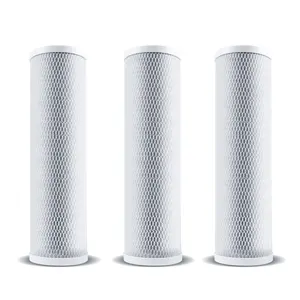
CTO Activated Carbon Filter Cartridge Carbon Block For Clean Water Odor And Taste Improvement Water Filter Cartridge

Karofi High-performance Smax Filter 6 Functional Water Filter Cartridge With Added Minerals Made In Vietnam




















Water treatment is a critical process for ensuring safe and clean water for a variety of uses. Among the many methods available, carbon filtration stands out as a popular choice. This category encompasses systems that use carbon, in various forms, to remove impurities and contaminants from water.
Activated carbon water filters are widely used due to their effectiveness in removing chlorine, sediment, volatile organic compounds (VOCs), taste, and odor from water. They come in different forms, including granular activated carbon (GAC) and activated carbon block filters. These filters are not only used in residential settings but also in commercial and industrial water treatment, such as activated carbon for wastewater treatment and GAC water treatment systems.
The core component of these filters is the activated carbon itself, which is typically derived from natural materials like coconut shells, wood, and coal filtration media. The carbon is processed to create a vast network of pores, increasing the surface area available for adsorption or chemical reactions. Activated granular carbon is a common form used in these filters, known for its efficiency in adsorbing contaminants.
One of the main advantages of using a water carbon filter is its ability to improve water quality without the use of chemicals. This method is effective in removing a variety of contaminants, which makes it a versatile solution for many water treatment applications. Additionally, carbon from water filters can be reactivated, offering a sustainable option for long-term use.
When selecting a carbon filter water filter, it is important to consider the specific needs of the application. For instance, a charcoal water filtration system might be ideal for residential use, while an activated carbon water filtration system could be better suited for industrial applications. It is also crucial to consider the size and flow rate requirements of the system to ensure efficient operation.
Maintenance of a carbon water filter is relatively straightforward, often requiring only regular filter changes. The sustainability of charcoal for water filtration is another significant benefit, as many carbon filters are made from renewable materials and can be reactivated through specific processing methods, reducing waste and promoting environmental responsibility.